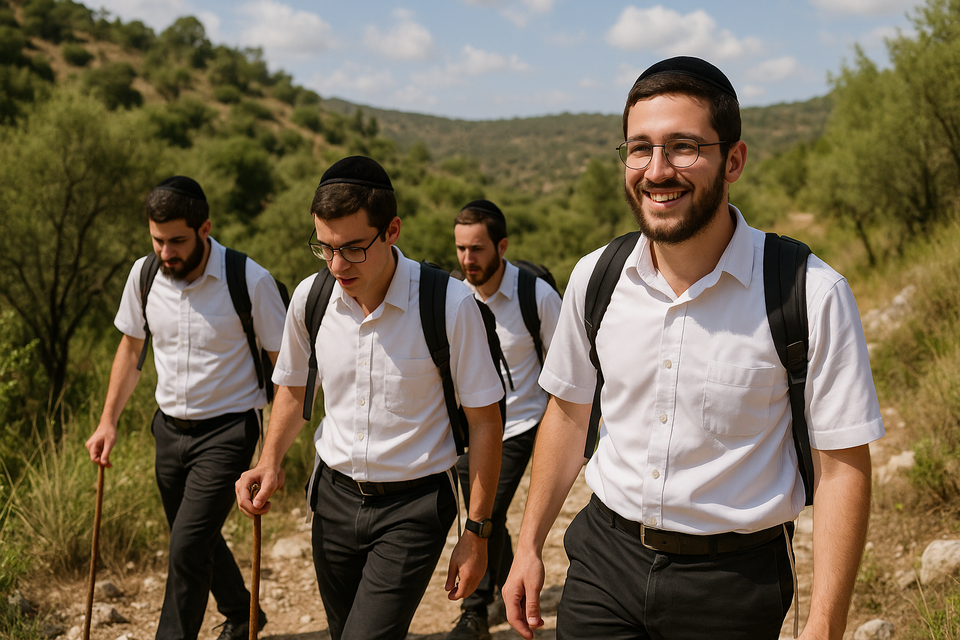If Learning Torah Is Their Service, How Can Charedim Go on Bein Hazmanim?

At the heart of this question lies a beautiful misunderstanding. People see yeshiva students traveling during bein hazmanim, and they ask: “If Torah is your ‘army,’ how can you take a break?” But the premise itself needs reframing.
Let’s understand what bein hazmanim is, what it’s for, and how it fits within the world of Toraso umnaso—a life dedicated to Torah learning.
What Is Bein Hazmanim?
The term bein hazmanim means “between the times”—specifically, between the three main zmanim (learning periods) of the year:
- Elul zman (Elul through Tishrei)
- Winter zman (Cheshvan through Nissan)
- Summer zman (Iyar through Av)
Between each of these is a short break—usually 2–3 weeks—set aside for menuchah (rest), binyan haBayis (family connection), and spiritual rejuvenation.
It is not “vacation” in the secular sense. It is part of the structure of Torah life. Even the greatest roshei yeshiva, such as the Brisker Rav, Rav Shach, Rav Aharon Kotler, and others, maintained the importance of bein hazmanim in yeshiva life.
Bein Hazmanim Is Not Bitul Torah
The assumption that bein hazmanim equals bitul Torah (neglecting Torah study) is simply false.
- Many bochurim continue learning during these weeks—either through personal chavrusos, bein hazmanim kollelim, or voluntary yeshiva programs.
- Entire cities like Yerushalayim, Bnei Brak, and Beit Shemesh run bein hazmanim programs in every neighborhood—hundreds of small kollelim and batei midrashim filled with people learning even without obligation.
- Others use this time for chesed missions, kiruv, helping with family needs, or traveling to strengthen relationships that will in turn enhance their learning the rest of the year.
Even when not in the Beis Medrash, Torah never leaves their minds. It is a lifestyle, not a job.
As the Chazon Ish zt”l writes:
“Even during rest, a true ben Torah is never fully at rest. Torah continues to accompany him in his thoughts and words.”¹
During War: Bein Hazmanim Is Often Canceled
Historically, during times of war or national danger, gedolei Yisrael have often shortened or entirely canceled bein hazmanim. Because if Torah is our defense, how can we rest when lives are in danger?
- During Operation Protective Edge (2014), many yeshivos extended the zman or held emergency sedarim.
- In 2023, following attacks on the northern and southern borders, major kollelim and yeshivos issued calls to “double the hours of learning”, even during bein hazmanim.
- After the tragic events of Simchas Torah 5784 (October 7th), dozens of yeshivos across the country canceled travel plans and filled batei midrashim with tefillah and Torah around the clock.
This is not new. During World War II, Rav Aharon Kotler kept his talmidim learning through fear and hunger, declaring:
“In times of war, the beis medrash becomes the frontline.”
And so it remains.
Why Bein Hazmanim Still Matters
But during regular times, bein hazmanim serves a real spiritual function. Long-term learning requires stamina, focus, and emotional health. The hours in yeshiva are not light—bochurim learn from early morning until late at night, often 10–14 hours a day.
Rav Shlomo Zalman Auerbach zt”l once said:
“Bein hazmanim is the oxygen that allows them to breathe, so that when the zman begins again, they can give it their all.”²
The Torah recognizes that human beings are not machines. The body needs rest so the soul can soar. Rav Elyashiv zt”l would tell avreichim to spend bein hazmanim with their wives and children—not for leisure, but to rebuild shalom bayis, which is a vital part of a Torah home.
What About Soldiers? They Don’t Get Breaks!
Soldiers are granted home leave, regalim, mental health days, and rotation schedules. In many units, soldiers have weeks off between deployments. The army, too, recognizes that without breaks, performance suffers.
So too with yeshiva bochurim. Bein hazmanim is the system's reset button, built not to weaken Torah learning—but to strengthen it long-term.
Torah Learning Never Truly Stops
And above all, it must be said: Even during bein hazmanim, the overwhelming majority of serious bnei Torah do not truly “take off”.
They daven at vasikin minyanim, learn with chavrusos, attend shiurim, and seek out new opportunities to grow.
It is simply untrue that Charedi men "drop their weapons" during bein hazmanim. On the contrary, they carry them with them—whether in a beis midrash, a crowded bus, or a hotel lobby on the way to a simcha.
Final Thought
Bein hazmanim is not a contradiction to Torah life. It is a Torah structure, built with foresight, compassion, and wisdom.
In wartime, Charedi yeshivos have shown they rise to the occasion. And in peacetime, they rest with purpose, so they can return to the battlefield of the mind and soul even stronger than before.
A soldier who never sleeps cannot fight.
A ben Torah who never rests cannot learn.
But one who does both—with the right intentions and under the guidance of Gedolei Yisrael—is doing his part to protect Am Yisrael in the most powerful way possible.
Sources & Footnotes
- Chazon Ish, Emunah u'Bitachon, Chapter 3
- Rav Shlomo Zalman Auerbach, quoted in Me’oros HaTorah journal, Bein Hazmanim edition, 2009
- Rav Aharon Kotler, Mishnas R’ Aharon, Vol. 1
- Igros Rav Elyashiv, Vol. 5 – Letters to Avreichim, Bein Hazmanim guidance
- Rav Yitzchok Zilberstein, Aleinu Leshabeach on Parshas Re’eh
